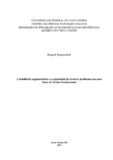| dc.creator | Ruppenthal, Raquel | |
| dc.date.accessioned | 2018-02-15T11:33:13Z | |
| dc.date.available | 2018-02-15T11:33:13Z | |
| dc.date.issued | 2017-02-23 | |
| dc.identifier.uri | http://repositorio.ufsm.br/handle/1/12433 | |
| dc.description.abstract | One of the goals of Science Teaching is to form autonomous individuals, critical, reflective, capable of solving impasses effectively. The central objective of this study was to investigate whether the use of pro-argumentation activities modify the argumentative levels and the problem-solving ability with a qualitative approach. It was used as resources for data collection instrument elaborated for analysis of arguments, test of the capacity to solve problems and interview. Students from the final years of Elementary School, from three schools (A, E, I), in the city of Ibirubá-RS, participated in the research. The instrument for the analysis of arguments was tested with students of the 6th grade of School I. It was verified the adequacy of the instrument as well as the relationship between the level of conceptual knowledge and the production of more elaborate arguments. The pilot study with the problem-solving test was carried out with 8th and 9th grade classes from school I, and it was convenient for later use, as well as pointing to students' difficulties with the Prediction and transfer factor. To achieve the central objective of the research, the argumentative level and the problem-solving capacity were described in three groups of 8th grade, of schools A, E and I, with low argumentative and problem solving levels. The class of the school I was interviewed in order to know the strategies used by the students to solve the test. It was observed that the greatest arsenal of strategies is related to the best performance in the problem solving test. This group participated in the intervention with pro-argumentation activity. After four months, it was observed that the statements of these students presented more elaborate reasoning strategies, such as the use of examples and comparisons to justify their arguments, which was not verified with the students of school A. The results suggest that the domain can be related to better performance in problem solving. | eng |
| dc.language | por | por |
| dc.publisher | Universidade Federal de Santa Maria | por |
| dc.rights | Attribution-NonCommercial-NoDerivatives 4.0 International | * |
| dc.rights.uri | http://creativecommons.org/licenses/by-nc-nd/4.0/ | * |
| dc.subject | Atividades pró-argumentação | por |
| dc.subject | Resolução de problemas | por |
| dc.subject | Alfabetização científica | por |
| dc.subject | Ensino fundamental | por |
| dc.subject | Ensino de ciências | por |
| dc.subject | Pro-argumentation activities | eng |
| dc.subject | Problem solving | eng |
| dc.subject | Scientific literacy | eng |
| dc.subject | Middle School | eng |
| dc.subject | Science teaching | eng |
| dc.title | A habilidade argumentativa e a capacidade de resolver problemas nos anos finais do ensino fundamental | por |
| dc.title.alternative | Argumentative skill and capacity to solve problems in the final grades of middle school | eng |
| dc.type | Tese | por |
| dc.description.resumo | Uma das metas do Ensino de Ciências é a formação de indivíduos autônomos, críticos, reflexivos, capazes de resolver impasses com eficiência. O objetivo central desse estudo foi investigar se a utilização de atividades pró-argumentação modificam os níveis argumentativos e a capacidade de resolver problemas, com uma abordagem qualitativa. Utilizou-se como recursos para coleta de dados instrumento elaborado para análise de argumentos, teste da capacidade de resolver problemas e entrevista. Participaram da pesquisa estudantes dos anos finais do Ensino Fundamental, de três escolas (A, E, I), na cidade de Ibirubá-RS. O instrumento para análise de argumentos foi testado com estudantes do 6° ano do Ensino Fundamental da Escola I. Verificou-se a adequação do instrumento, bem como a relação existente entre o nível de conhecimento conceitual com a produção de argumentos mais elaborados. O estudo-piloto com o teste da capacidade de resolver problemas foi efetuado com turmas de 8° e 9° anos da Escola I, e mostrou-se conveniente para utilização posterior, além de apontar para dificuldades dos estudantes com o fator Predição e transferência. Para atingir o objetivo central da pesquisa, descreveu-se o nível argumentativo e a capacidade de resolver problemas em três turmas de 8° ano, das escolas A, E e I, constatando baixos níveis argumentativos e de resolução de problemas. A turma da escola I foi entrevistada a fim de conhecer as estratégias utilizadas pelos estudantes para resolver o teste. Observou-se que o maior arsenal de estratégias está relacionado com o melhor desempenho no teste de resolução de problemas. Essa turma participou da intervenção com atividade pró-argumentação. Após quatro meses, observou-se que os enunciados desses estudantes apresentaram estratégias de raciocínio mais elaboradas, tais como a utilização de exemplos e comparações para justificar seus argumentos, o que não foi verificado com os estudantes da Escola A. Os resultados sugerem que o domínio argumentativo pode estar relacionado ao melhor desempenho na resolução de problemas. | por |
| dc.contributor.advisor1 | Schetinger, Maria Rosa Chitolina | |
| dc.contributor.advisor1Lattes | http://lattes.cnpq.br/4401319386725357 | por |
| dc.contributor.referee1 | Carpilovsky, Cristiane Kohler | |
| dc.contributor.referee1Lattes | http://lattes.cnpq.br/4448958129584458 | por |
| dc.contributor.referee2 | Santos, Marlise Ladvocat Bartholomei | |
| dc.contributor.referee2Lattes | http://lattes.cnpq.br/8931396120785208 | por |
| dc.contributor.referee3 | Boer, Noemi | |
| dc.contributor.referee3Lattes | http://lattes.cnpq.br/7067957507021073 | por |
| dc.contributor.referee4 | Canto-Dorow, Thaís Scotti do | |
| dc.contributor.referee4Lattes | http://lattes.cnpq.br/5292365079708795 | por |
| dc.creator.Lattes | http://lattes.cnpq.br/6918823752779978 | por |
| dc.publisher.country | Brasil | por |
| dc.publisher.department | Ciências Biológicas | por |
| dc.publisher.initials | UFSM | por |
| dc.publisher.program | Programa de Pós-Graduação em Educação em Ciências: Química da Vida e Saúde | por |
| dc.subject.cnpq | CNPQ::CIENCIAS BIOLOGICAS | por |
| dc.publisher.unidade | Centro de Ciências Naturais e Exatas | por |



